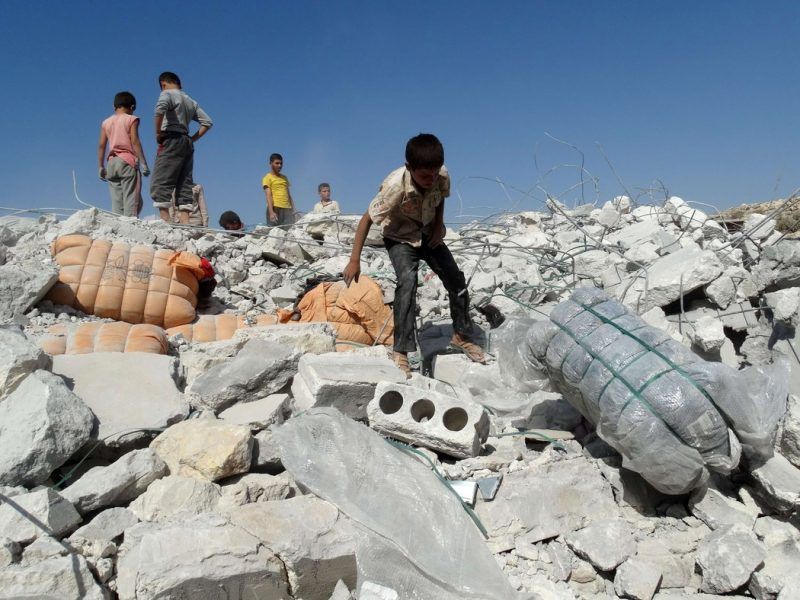
President Obama made the right decision to boost military aid to moderate Syrian rebels last year, but today America’s approach to attacking Islamic State fighters risks undermining the moderate opposition and alienating support among the Syrian public.
Last Friday, for the first time I can recall, opponents of the government of President Bashar al-Assad burned an American flag, and anti-American demonstrations mushroomed across opposition-held areas in Syria. These people have no love for the Islamic State, also known as ISIS, but this means something went seriously wrong with our initial campaign of airstrikes.
The rebels were furious that the Americans had not targeted the Assad government, which has killed far more Syrian civilians than the Islamic State has. Syrians perceive, wrongly, that the Americans and regional allies don’t care about the government’s atrocities, and are concerned only with the Islamic State. Our targeting of terrorist elements attached to the Nusra Front — the Syrian branch of Al Qaeda, which is fighting the Assad government — added to the rebels’ suspicion that the Americans were helping Mr. Assad as much as fighting the Islamic State.
Moderate armed opposition groups also looked foolish because the American side didn’t coordinate the strikes with them, even though we have worked with them before. An American journalist on the Turkish border told me last week that moderate rebels were briefed on the strikes only after most of us had already seen the video evidence via the Internet. We also made the moderate fighters appear naïve about working with us because the attacks didn’t much help their battles against the Islamic State in northern Syria.
With public distrust of American motives running high in Syria, we’re disempowering the very opposition we’re supposed to be helping. Leaders of the Free Syrian Army have demanded that attacks focus on “the forces of tyranny and the patrons of extremism represented by the Assad regime.” We need a swift tactical adjustment to reassure the Syrian opposition of our good intent.
The United States and its partners must supply more ammunition and equipment to moderate groups in northern and southern Syria. Since 2011, the moderates have been hampered by unreliable supply lines — to the benefit of government forces, as well as extremist opposition groups like the Islamic State and the Nusra Front. Moderate fighters near the northern city of Aleppo are in especially urgent need since they face the Islamic State on one front and government troops on another. Logistical support must be a more urgent priority than training programs, which will take months to bear fruit.
The United States has directly supported the moderate opposition for 18 months — help that long predates our actions against the Islamic State. We could do more to remind Syrians of this, both in public and in private.
The administration must also avoid the mistake we made before, with the Syrian armed opposition’s military command, when we and our regional friends funneled aid directly to myriad groups. We must support a unified Syrian command structure by channeling our assistance through it, and we need to insist that our Arab allies do the same. Otherwise, our actions will only help to fragment the moderate armed opposition.
We should be doing more to coordinate our attacks with opposition commanders. Obviously, we cannot risk compromising our operations and intelligence security, but we should be communicating better with moderate fighters so that they can exploit our airstrikes against the Islamic State and recommend targets. Longer-term strategic goals need to be part of these discussions, since this will be a long campaign.
Better communication also extends to an effort to reach Arabic media with information about whom we’re bombing and why. Our targeting of Nusra Front jihadis was a case in point: Nobody in Syria had ever heard of Khorasan. The message that these particular jihadis were planning attacks against Western targets was lost on a Syrian audience: To them, it simply looked as though we were targeting a force that was engaged in fighting Mr. Assad. Another example came when coalition aircraft blew up a grain silo in Islamic State-occupied northern Syria. In a country starved of food supplies, Syrians were outraged.
As we explain our actions, we have to avoid the mistakes made in Iraq. Military operations unfortunately carry the risk of civilian casualties. We need to ensure our targeting intelligence is as accurate as possible, but if operations cause civilian casualties, we must broadcast clear expressions of regret, not denials, to the Arabic-language media.
Headlines about the American military’s relaxing its guidelines for determining acceptable levels of risk to civilians only made this task harder. If we aim to deprive the Islamic State and the Nusra Front of popular support, that kind of message is counterproductive.
The way the administration talks about the moderate Syrian opposition is crucial. Top officials now say that boosting the capabilities of these rebels is vital to American strategy against the Islamic State, and that we will still press Mr. Assad to accept a transitional government. But even this year, in an effort to defend past hesitation about supporting the moderate rebels, officials have talked about them as some kind of civilian rabble. The moderate opposition and its fighters were never that, but if we’re still saying so, it undercuts confidence within Syria and the region about America’s commitment to implementing our policy now.
Robert S. Ford, a senior fellow at the Middle East Institute in Washington, was the United States ambassador to Syria from 2010 to 2014.
